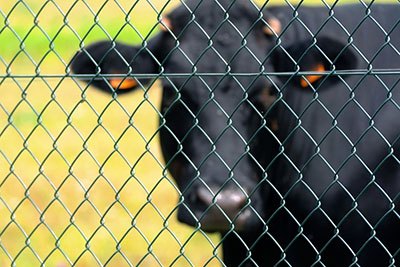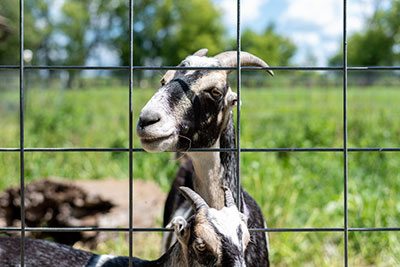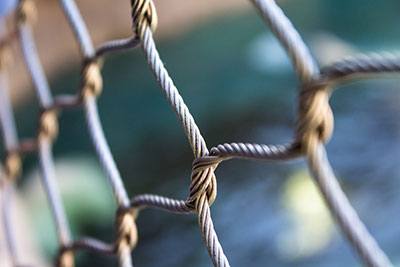Are you looking to fence off your property or need a stronger barrier than regular chain-link fencing can provide? It’s time to learn more about woven wire fences.
This type of fencing is aesthetically pleasing since it comes in a variety of colors and sizes. But its strength and long-term durability make it an excellent option for many homeowners.
In this guide, you will find all the essential facts about woven wire fencing systems. From understanding the types available to learn how to install them easily, you can be confident that this is the right solution for your needs.
Take away key points:
- Woven wire system is strong and composite due to post spacing and high-quality material
- The fence is multifunctional, suitable for different predators, ensuring advanced protection for your farm
- You can use the systems as electric fences as well
Table of Contents
- Woven wire fences for newbies: What you must know
- FAQs
- How far apart should fence posts be for woven wire?
- What is a woven wire fence suitable for?
- What is the life expectancy of a woven wire fence?
- Is woven wire fence good for dogs?
- Is woven wire fence good for horses?
- Can you electrify the woven wire fence?
- What is the difference between woven wire and welded wire?
- How tight do you stretch woven wire fence?
- How to install woven wire fence with t-posts?
- Conclusion
Woven wire fences for newbies: What you must know
If you need to know more about the woven wire fencing models, their pros and cons, and how to install or maintain them properly, read our guide below. We will answer all your questions.
What is woven wire fencing & its purpose?

A woven wire fence is a type of fencing made from interwoven metal wires. It is often used to contain smaller animals, chickens, poultry netting units, and livestock, such as horses and cattle, or to protect gardens from animals.
These fences are strong and durable and come in many different sizes and many different forms. Woven fence wire-rolled fences are an ideal choice for many applications. They can also be used to create decorative borders around yards and gardens.
The mesh pattern of the wires makes the vertical and horizontal wires strung tightly on T-posts. It’s difficult for farm animals to climb over or push through the fence, providing an effective barrier between them and the area they are trying to access.
Is woven wire rolled fencing any good?
Fencing wire rolls are well-suited for many uses. They are strong, durable, and made of high-quality materials. These fence types can be used to keep animals in or out of an area. They also offer a high level of visibility, making them ideal for use in areas where you need to keep an eye on your livestock, horses, cattle chickens, or farm property.
The woven wire fencing system in a variety of sizes and styles, so you can find one that fits your needs perfectly. Additionally, they are easy to install and maintain, making them a cost-effective option for many people.
Pros & cons of woven wire fencing
When it comes to fencing, woven wire is an excellent choice for many reasons. It is strong, durable, and relatively easy to install. However, some drawbacks should be considered before making a decision.
Here are the pros and cons of woven wire fencing:
Pros
– Wire fences are constructed strong and durable, making them ideal for containing livestock or keeping out animal intruders.
– They are relatively easy to install compared to other types of fencing.
– The mesh design allows for flexibility when it comes to shaping the fence around uneven terrain or obstacles.
– The openings in the mesh can be adjusted to prevent animals from climbing over or through the fence.
– Wire fences are usually more affordable than other materials.
Cons
– Wire fences can be difficult to shape or bend into certain shapes due to their solid construction.
– They require regular maintenance to keep them in good condition and functioning properly.
– The openings in the mesh can allow small animals such as mice or snakes to get through if not properly secured.
– Wire fences can be expensive compared to other types of fencing materials.
How to install woven wire fences?

Installing woven wire fencing is an effective way to contain animals and protect your property. Here are the steps for installing a woven wire fence and you keep your animal needs optimal:
– Start by cutting the horizontal wire system free on the end of the roll and wrapping that tight around one of your corner posts.
– Slide a light gauge log chain through the PVC pipe and hook the end together. You can then hook it to anything and pull to unroll it or buy hand reels for larger fences.
– The woven wire fence design uses a 13-48-6 fence with a post spacing of 12 feet. Make sure you have enough posts for your desired length of fencing, as well as any gates you might need.
– When constructing corner assemblies, make sure to use heavy-duty braces that will support the weight of the fence when it’s installed. This will help ensure that your fence remains secure over time.
– Once all of your posts are in place, attach the wires to them using staples or clips designed specifically for this purpose. Make sure each wire is securely attached so that it won’t come loose over time due to weather or other factors.
– Finally, add any additional features such as barbed wire or electric fencing if desired, making sure all connections are secure and properly insulated from moisture and other elements that could cause damage over time.
Maintenance tips for woven wire fencing
Maintaining woven wire fencing is important to ensure that it lasts for years and remains secure.
Here are some tips on how to properly maintain your woven wire fence:
– Check the fence regularly for signs of wear and tear, such as broken wires or posts that have become loose. Make sure to repair any damage immediately.
– Inspect the fence for any rust or corrosion, especially if it is made of galvanized steel or other metal materials. If you find any rust, use a wire brush to remove it and then apply a rust-proof coating to protect the metal from further damage.
– Trim back any vegetation that has grown up around the fence, as this can weaken the structure over time.
– Use a pressure washer to clean off dirt and debris from the fence periodically, as this will help keep it looking its best and prevent corrosion from forming on the metal parts of the fence.
Woven wire vs. welded wire fence
Each has its advantages and disadvantages, so it’s important to consider your needs before deciding which is the best field fence for you.
Welded wire fencing is a solid structure made of metal wires that are welded together at each intersection. This makes it strong and inflexible, making it ideal for containing large animals or keeping out intruders.
Welded wire fences also require less maintenance than other types of fences since the wires don’t need to be replaced as often. However, welded wire fences can be more expensive and may not provide enough flexibility if you need to adjust the size or shape of your field fence in the future.

Woven wire vs. barbed wire fence
Woven wire fencing is made up of horizontal wires that are strung on T-posts or wooden fence posts. This type of fencing is more expensive than barbed wire fencing, but it is also more durable and can last longer than barbed wire fences.
It also requires less maintenance than a barbed wire fence, as the wires are less likely to become loose over time.
Additionally, woven wire fencing provides better protection against predators and other animals that may try to get into your property and harm your livestock or cattle.
A barbed wire fence consists of horizontal wires with evenly spaced barbs along them. This type of fencing is cheaper than woven wire, but it requires more maintenance as the barbs can become loose over time.
Additionally, the barbed wire does not provide as much protection against predators as the woven wire does. So, it is not the best horse fence, cattle, and livestock fencing protection.
FAQs
How far apart should fence posts be for woven wire?
The roll fence wire post spacing should en 16 feet, as the manufacturer states.
What is a woven wire fence suitable for?
It is suitable for animal confinement (farm animals such as a horse, goats, chickens, etc.), a garden, a yard, and preventing predators from harming your farm animals.
What is the life expectancy of a woven wire fence?
Woven wire fencing should last between 20 and 30 years, thanks to its durability and strong material combination.
Is woven wire fence good for dogs?
Yes, woven metal fencing is the best-woven wire fence for dogs and similar animals.
Is woven wire fence good for horses?
Yes, woven wire fencing is ideal for horses, just like electric wire fencing, and high-tensile materials.
Can you electrify the woven wire fence?
Yes, you can electrified wires for extra strength to create the electric wire fencing.
What is the difference between woven wire and welded wire?
Welded wire animal fences are sturdier than woven wire fence rolls.
How tight do you stretch woven wire fence?
Pull around bend or half, or curve out of the wire during installation.
How to install woven wire fence with t-posts?
Follow the steps below:
– Measure the area you want to fence
– Get the necessary materials, including t-posts, woven wire fencing, and tools such as post-hole diggers, pliers, and wire cutters.
– Dig post holes at least two feet deep along the perimeter of your property, spacing them 8-12 feet apart depending on the size of your fence.
– Place the T-posts in the holes and fill them with concrete or dirt to secure them in place. ensure they are straight before moving on to the next step.
– Unroll the woven wire fencing along the length of your fence line, attaching it securely to each t-post with pliers or wire cutters. Don’t leave any gaps between posts that could allow animals or intruders access.
– Use pliers or wire cutters to trim off any excess material at the ends of each section
– Check all sections of your fence for stability and security
Conclusion
Woven wire fencing systems come in different gauges and sizes to keep your animals and property safe. You can use it for your garden, yard, goats, horses, etc. to ensure no predators can harm your farm.
The combination of composite and strong material details will extend its lifespan, and keep it optimal for more robust use.
